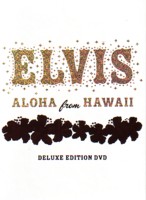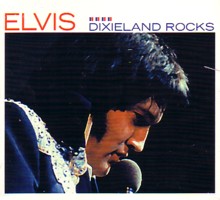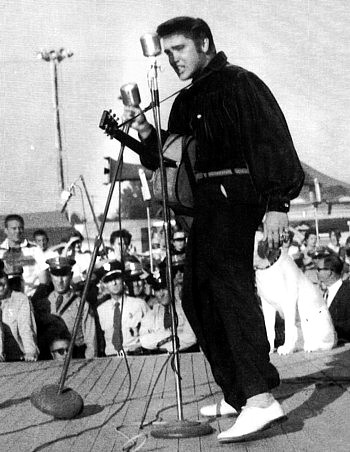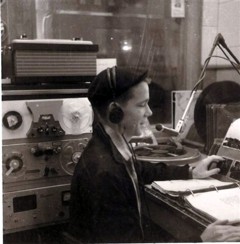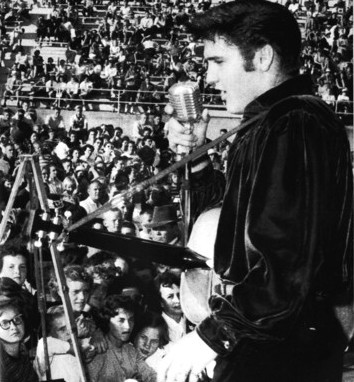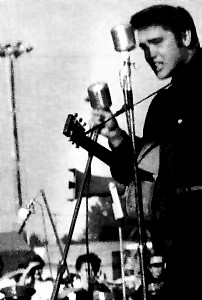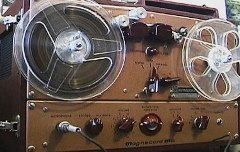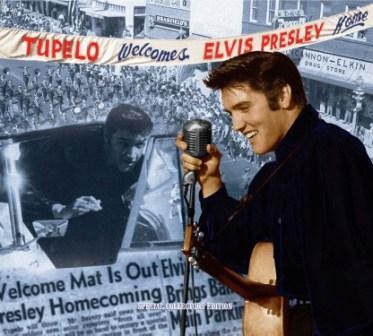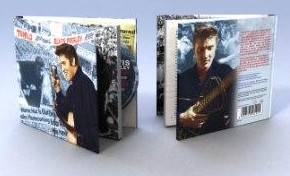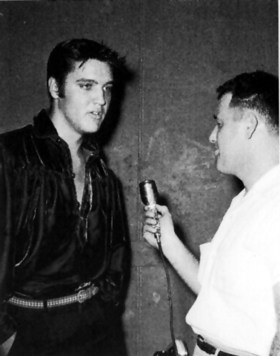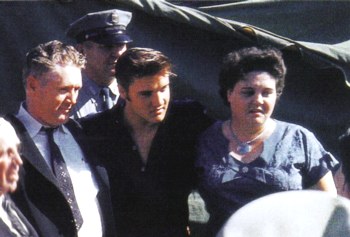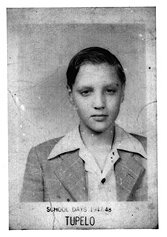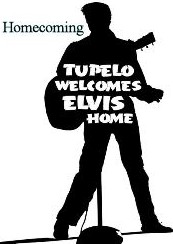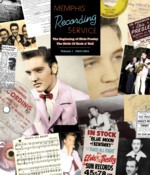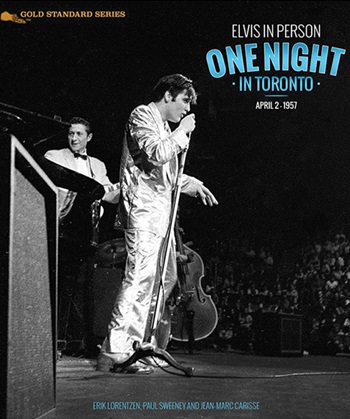 |
 |

Ron Brandon was the WTUP radio engineer; Charlie Watts was the announcer that did the interviews with Elvis, his Father and Mother, with Nick Adams, and with "a fan". They were recorded alongside the outdoor stage, on a one-track Magnecord recorder. The emcee of the concerts was the general manager of WTUP, Jim Reese.. hence their access to backstage and Elvis. There was a backstage tent that served as Elvis' dressing room and the WTUP recorder was set up directly alongside the stage. Without the foresight of Ron Brandon Elvis' Tupelo concert would never have been put on tape. EIN's Piers Beagley recently spoke to Ron Brandon to find out more of the incredible story of how this historic Elvis performance happened to be recorded for posterity. INTERVIEW PART ONE - EIN: Ron Brandon it's great to talk to you. Can you tell me what were you doing in Tupelo that day? Did your family come from Tupelo? Ron Brandon: I had been born just outside Tupelo, in Sherman, Mississippi, in 1938. I lived in a little town between Tupelo and Memphis called New Albany until the age of 12, when I moved to Memphis and lived until graduating high school in 1956. I had the job at WTUP for only a few months at the time of the fair.. was hitch-hiking daily to get to work. EIN: Did you realise that Elvis was a famous native of the Tupelo area? Before the "homecoming" concert and parade was the fact that Elvis was from Tupelo celebrated by the locals? Ron B: Sure, we were very aware of the fame of Elvis. Hound Dog and Don't Be Cruel were out.. Heartbreak Hotel..so we were well aware of his ascending star. Whether or not his fame was "celebrated" by the locals was mostly a matter of age. Those my age who loved the new music certainly did; the older folks..not so much. They thought it was a fad.. something they were not too proud of.. and likely hoped it would go away. And there was considerable condescension on the part of the older Tupelo residents toward the Presleys.. persons of lesser status, education, etc.
EIN: So what was your and Charlie Watts jobs at WTUP, were you both engineers and Disc Jockeys? Ron B: WTUP was a very small station and staff. Charlie Watts was the station "announcer" and I was the station "engineer." I mostly tinkered with the equipment, but they quickly let me run the board.. and play rock and roll in the afternoon. At the time I went to work for WTUP in the summer of '56, I was hired strictly as their engineer. But Jim Reese, the manager, quickly figured that if the kid who was playing rock and roll afternoons left.. and I did it.. he would only have to pay one salary, not two. And that occurred shortly afterward. And that was the beginning of my 30-year career and a DJ, Program Director, and General Manager at rock and roll / top-40 stations mostly in the southeast (Richmond, Charlotte, Atlanta, New Orleans, etc). My point being.. I was far more caught up in radio than I was in Elvis.. we just happened to cross paths. EIN: With Station Manager Jim Reese also there it seems like the whole of WTUP was there that day to see Elvis? Ron B: I guess that just about everybody did turn out for the concerts.. Tupelo was a small town and the fair itself was the big event of the year.. with or without Elvis. I'm disappointed that Jim Reese, the manager of WTUP and mc of the concerts.. has never received any recognition. I don't know how he arranged to be the mc and for us to be allowed backstage. But I think it might be because WTUP actually played a segment of rock and roll, including Elvis, afternoons.. and the other station in town, our competitor, WELO, played no rock and roll - or Elvis - at all.
EIN: You ran the recorder for Charlie Watts who did the interview. Do you remember meeting Nick Adams and Elvis' parents on the day? Ron B: Sure.. remember Nick and Elvis' parents well. Even though I was a huge fan of the movie "Rebel Without A Cause" when we did the interview with Nick I did not recognize him or the fact that he had been in the movie. Having grown up in a family with similar backgrounds as the Presleys it was very easy to identify with them. They were very humble people and seemed almost in a state of shock that day. It was very apparent that it was still very new to them, and not only a very major change of lifestyle, but to be celebrated in the town that had offered them so little previously, was quite an adjustment for them. EIN: What was the most memorable moment about the event apart from the concert itself? How excited were you to actually meet Elvis? Ron B: In retrospect now having spent 30 years in radio, promoted concerts, and met many "stars" along the way.. I've never been too much in awe. Most of them were like Elvis.. gracious and easy to approach. We still thought of Elvis as just a hometown boy and likely at that time had no recognition of what a major star he had become.. and certainly no inkling of what his legend would be.
Had anyone had any idea of the importance of Elvis in the future we would have recorded everything on film, tape, etc.. saved everything. At that time I had an autographed 78rpm Sun label of "That's All Right".. autographed by Elvis. I gave it away to some girl that I could not name today. It just never occurred to anyone that it would be important in the future. If you had told anyone then that radio stations today would still be playing that music, we would have thought you were nuts. EIN: Don't you think it somewhat strange, in fact stupid, that Colonel Parker didn't record Elvis at every show or would perhaps the set-up have been to expensive for Parker's pocket?? Ron B: I suspect that although Col. Parker had some skills, he did not recognize the possible potential of Elvis. He likely was very short sighted.. as we apparently all were. EIN: What did you think when your tape of the concert suddenly came out on the 1984 Elvis "Golden Celebration" set? Ron B: When the "Golden Celebration" was released I was shocked to find that my recording.. interviews, concert, etc.. appeared to have been "stolen." I immediately began to work the phones to see if I could pinpoint the guilty culprit. This was, of course, years prior to the internet.. and I had little success, until I tracked down some guy with the A&R department at RCA in New York. I related my story, asked where the recording came from, and was told that the tape had "been found in the closet of Elvis' bedroom at Graceland" after his death.
The interviews were better quality than the concert though, and I knew how close he was to his mom.. so I thought he might like a copy. In return within a couple of weeks, Elvis was, in turn, kind enough to send me a package containing a short note of thanks.. several autographed pictures and other mementos, which I promptly gave away on my radio show on WTUP. Again, I saved nothing! EIN: Did RCA every try and find out who recorded the tape or give you some kind of acknowledgment? Ron B: I am not aware of RCA attempting to find out the source of the tape. Other than the conversation I had in 84 with the A&R person in New York, I have never spoken with anyone else about it. And neither Charlie nor I received any credit, which was a great disappointment to both of us. EIN: So do you still have the original tape? Ron B: No I no longer have the tapes. I left them with my mom when I went into the military, about the same time as Elvis. I never missed them until the RCA release in 84, and looking for them then, realized that I did not have them. So either my mom tossed them, or they were subsequently misplaced when I was divorced, or in one of the many moves I made from town to town and radio station to radio station. Perhaps they are with my ex-wife, of in a closet someplace, and will turn up one day. EIN: Did you keep any of Elvis' signed photos or mementos? Ron B: No I was never much of a saver of pictures or mementos.. wish I had. There were lots of memories. I did save a few things.. how about a contract I had with a concert by The Who in 1968 in Richmond, Virginia.. where they played two shows for $3000.. bet they wouldn't do that today. EIN: What do you think of the Tupelo concert recording now? While you still describe the sound as horrific, for an "illegal" recording it still captures all the excitement of the show. And for a microphone near the speaker horn it could have been distorted to hell! Ron B: I hope that I will find the tapes, more than one since the reels were 30 minutes each, one day.. for there is additional material on there that RCA did not release. But I'm happy that somehow it survived, and is available to the real fans. EIN: You moved to Memphis later on. Did you ever come across Elvis when you lived there? What about Dewey Phillips? Ron B: When living in Memphis we truly listened to Dewey every night on WHBQ. He introduced us to so many artists that simply could not be heard otherwise. And he was so unique.. totally different from anything else on the radio. He came along at the right time in the right place.. none of what he did would be allowed today. I don't recall that I was aware of Elvis when I lived in Memphis, although I now realize that when he lived on Lamar Avenue we only lived about six blocks apart. And I used to caddie at Riverside Park, where Elvis would go to park with Dixie. I really became aware of Elvis when I moved back to Tupelo. EIN: Did you follow Elvis' sixties career, through all those terrible movies and to the amazing Comeback? Did you get to see Elvis in concert later on? Ron B: I didn't think of Elvis as I pursued my career.. in the military.. and 30 years in radio. I was very proud of his accomplishments and when had came back with his hits in the late 60s. I saw him in concert in Charlotte in the early 70s, and was amazed at much more powerful his voice was. EIN: By that time Marty Lacker who you knew was working for Elvis. Did you ever contact Marty so that you could get to see Elvis and tell him you were the guy who sent him the tape? Ron B: Marty Lacker and I, by some strange coincidence, worked together at WNOE in New Orleans in 1964 or so. He was the production director and I was one of the DJs. I don't recall that we even made the "Elvis" connection or discussed it. I do remember that we weren't sure that we believed him when he said that he was quitting and going back to work for Elvis.. and were quite surprised when he did. When I got interested in the subject of Elvis within the past year I managed to track down an email address for Marty.. and we exchanged mail.. and caught up on old times. I don't think I ever told him that I am the guy who recorded that concert, so if he sees this it will be news to him. Also, in the late 70s when I was in Atlanta publishing a radio/records "tip" sheet, I got to know George Klein quite will... and don't think I ever mentioned the recording to George either. EIN: When was the last time you ever saw Elvis? When did you hear about Elvis' death? What did you think? Ron B: The only other time I saw Elvis was the Charlotte concert I mentioned. On the day of Elvis' death, my wife and I were working on the publication I just mentioned, when one of our correspondents in Memphis, Courtney Kaufman, telephoned and told us of his death. Like many, we almost could not believe it. EIN: I believe that since you contacted us you have managed to meet up with Charlie Watts. How long had it been since you talked with him and was he surprised to hear from you again? Ron B: My conversation with Charlie a couple of months ago was the first time I had talked with him in 53 years.. it was a real pleasure and delighted to find that he has done so well.
When I was touring the Elvis museum there in East Tupelo a couple of years ago, the audio from the 56 concert was playing in the building.. and it gave me quite a moment of satisfaction.. to know that I was the guy that had made it happen. EIN: THANKS so much for the interview and the stories. And I know that you also deserve a big thanks from all Elvis fans for what you did that day. Ron B: Glad to tell the story... let me know if want to know anything else. SEE BELOW FOR PART 2 of our exclusive EIN interview Interview by Piers Beagley Click to comment on this review Go here for more infomation about Ron Brandon and his Radio career
Ron Brandon Interview PART 2 - With the release of the MRS ‘Tupelo Welcomes Elvis’ book/cd, Ron Brandon the engineer who recorded the concert sent EIN this message. "I received the new Tupelo MRS release today and I am sure I am not the first to tell you that it is outstanding. And to everyone involved, I (and Charlie Watts) are indebted to each of you for finally making it possible for us to get a bit of recognition for being there way back all those years ago. I have sent one along to Charlie, and I'm sure he will be as impressed as I am. Click here to order: 'Tupelo Welcomes Home Elvis Presley' sorry now Sold Out Our original interview with Ron Brandon (above) received a lot of positive feedback from EIN readers. We were therefore delighted that Ron agreed to answer a few more follow-up questions about his time in Tupelo. EIN: Tupelo photographer Terry Wood sadly died last weekend. Did you know him? - Some fans would like to know more about what it was like working in radio in those early rock'n'roll days? Ron: Radio in those days.. and in particular, Tupelo radio. I had just gotten into the biz, and was being allowed to actually open the mike and play rock and roll in the afternoon on WTUP. I can categorically tell you now.. that was the biggest thrill of my life. I can equate it to the thrill that Elvis must have felt hearing his record on the air for the first time. In those days, in Tupelo, there were two stations.. WTUP and WELO.. and one TV station (though I have forgotten the call letters). These two stations had coverage areas of maybe ten miles around Tupelo. In the daytime with a good radio you might hear one or two of the Memphis stations (100 miles away) in the daytime, but not at night. At night, if you wanted to hear rock and roll or black music - it was then called "race music" - you listened to 50,000 watt WLAC in Nashville. These out of town stations were the only sources of rock and roll, except... WTUP. EIN: WTUP has the fascinating reputation of a 1946 Mississippi Slim radio show when Elvis was featured as a young 10 year-old? Ron: WTUP had been playing rock and roll after school was out afternoons for a year or so. WELO, on the other hand, played no rock and roll.. not even Elvis.. up until the time of his homecoming. Radio programming then was very different than now. Then, almost all stations "block" programmed... that is, one block (30, 15 minutes, an hour) of country music, a block of news, the Tennessee Ernie Ford show, etc. But there was no rock and roll except for WTUP. (As an aside, the 50s were a time of considerable racial turbulence in the south.. and nowhere more than Tupelo. When racial problems were headlining the news, Jim instructed me to discontinue playing music by any black artists (Fats Domino, Chuck Berry, etc) until "things calmed down.") At the time I went to work for WTUP in the summer of '56, I was hired strictly as their engineer. But Jim Reese, the manager, quickly figured that if the kid who was playing rock and roll afternoons left.. and I did it.. he would only have to pay one salary, not two. And that occurred shortly afterward. And that was the beginning of my 30-year career and a DJ, Program Director, and General Manager at rock and roll / top-40 stations mostly in the southeast (Richmond, Charlotte, Atlanta, New Orleans, etc).
EIN: What other do things do you remember about Tupelo at the time? Ron: Things that I remember about Tupelo during my time, which would have been 8-9 years after Elvis had lived there but likely would have changed little. WTUP was located on the levee between Tupelo and East Tupelo, so I knew East Tupelo well... I dated a number of girls from there! Drive-in restaurants were where you went if you had a car... although they offered inside sit-down service as well. In East Tupelo it was Johnny's Drive-In right on highway 78.. just a couple of blocks from Elvis' old house. Just pull up.. honk your horn.. and wait for "car-hop" service. The skating rink was on the levee.. and was extremely popular activity with kids.. I would bet that Elvis went there whether he skated or not. I used to trade the owner free records for free skating.
Vernon, on the other hand, while overwhelmed by the volume of changes.. seemed to be enjoying much of it. I'm certain he felt a certain smugness, of course justified, at the status of being celebrated in the town that had offered them nothing but hardship. There really was class discrimination then, and they had experienced the worst of it. Elvis, however.. was having the time of his life. In re-listening to the concert and interviews for the first time in a long time.. the memory jumps out at me as to how much fun we, at our very young ages, were having. I know that Elvis shared some of the "we showed them" attitude with Vernon, but more than that.. he was simply enjoying the moment. In retrospect, I would guess that for all his fantastic career.. this might have been one of the most "fun" times for him. I remember his jauntiness as he approached Charlie and myself for the interview.. he was high and this was long before the drugs. He loved the adulation, the music, the freedom that he could now provide for his family, the girls, all of it at once.. how could his life have been any better. Certainly this must have been a pivotal moment.
EIN: It sounds so different to what we see now? Ron: I must also speak of "knowing your place". It was much more prevalent then than now. If you grew up very poor as Elvis and his family did - and me and my family just a few miles down the road - you quickly learned, and pretty much accepted, your status in life. You knew that you were different, that there were places that you were not welcome, crowds that you did not mix with, girls you did not approach. It was hard to accept.. and naturally it was an obstacle that you wanted to overcome. Elvis did.. to a degree that will likely not be repeated again soon.. but I don't think that most people can imagine what a major transition that involved. It's amazing to me that he managed to stay as level-headed as he did, and perfectly understandable the difficulties he found himself in later. For his parents, it was an impossible transition. When you read the stories of "hanging clothes on the line out back of Graceland, and chickens in the yard" just try to remember their background. As an example, in the 1960s as I achieved some success as a DJ, we were given at no charge, bottles of uppers (which in our innocence of the day) we were unaware of the dangers. and I had a good friend who died in his 40s with resultant problems. We simply did not have the knowledge then that we do now. EIN: Things have changed so fast... Ron: When I return to Tupelo now, as I did a couple of years ago, it is overall still familiar. WTUP's radio tower is still out just off the levee although the building is long gone. But Tupelo today is a very progressive, small city. The downtown area has been preserved well, and much is still familiar. Elvis would have gone to the Lyric theater, which is still there just opposite the courthouse which has been there long before all of us. Had Elvis had a car, he would have gone to the 78 Drive-In theater, just outside Tupelo on Highway 78. But the feel of the small town is gone. Most of the fairgrounds area where the concerts took place is changed. You would need a good local guide to find the spots where Elvis might have trodden. But it's certainly well worth the visit. I plan to return often. EIN: Thanks so much for your time - and please say Hi to EIN's good friend Roy Turner when you get to Tupelo. Ron: I will - and thanks to you for allowing us to share even more of the story, and to get it in the record books. Interview by Piers Beagley Go here for other relevant articles. Go here to see EIN's in-depth review of the original 'Tupelo's Own' release - Now Sold Out. EIN Interview with Roy Turner, Tupelo/Elvis historian EIN interview with Elaine Dundy
EIN Website content © Copyright the Elvis Information Network.
Elvis Presley, Elvis and Graceland are trademarks of Elvis Presley Enterprises. The Elvis Information Network has been running since 1986 and is an EPE officially recognised Elvis fan club.
|
|
